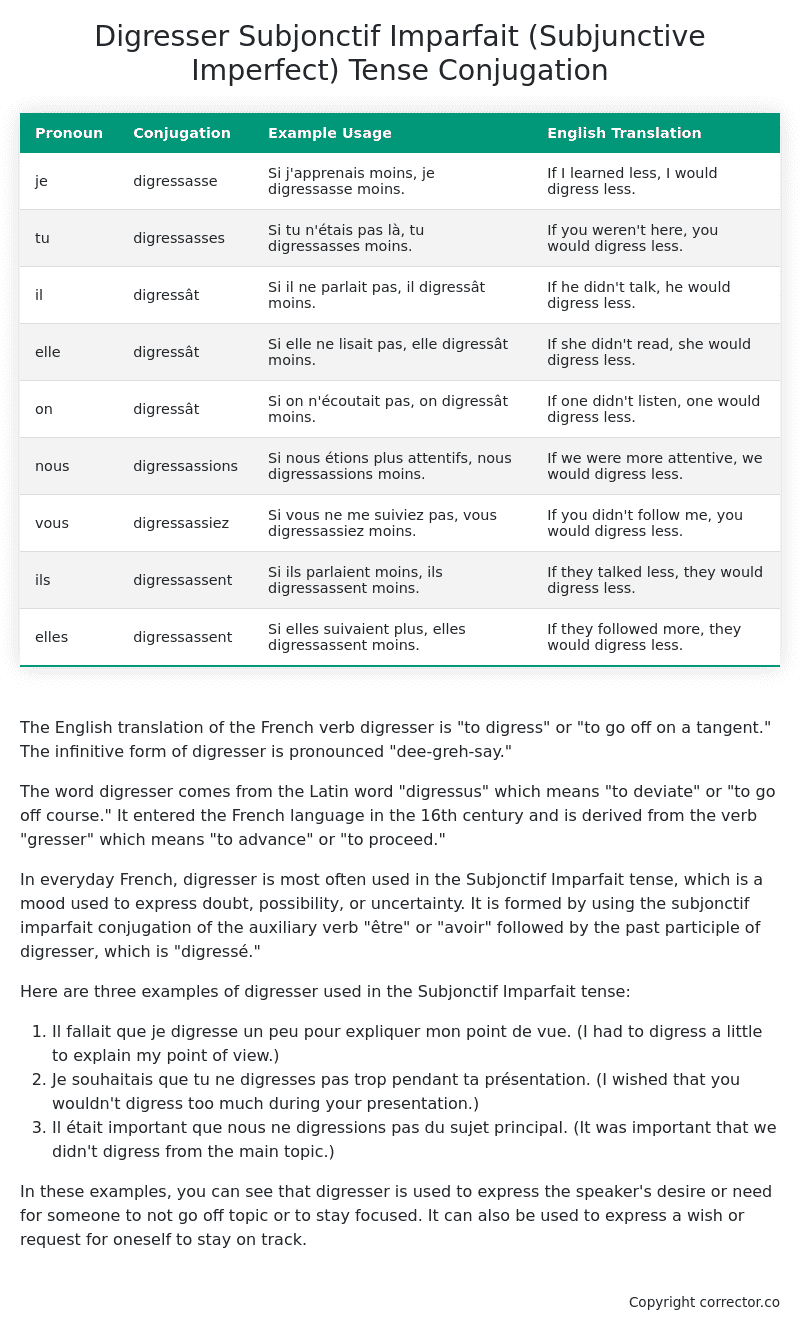Subjonctif Imparfait (Subjunctive Imperfect) Tense Conjugation of the French Verb digresser
Introduction to the verb digresser
The English translation of the French verb digresser is “to digress” or “to go off on a tangent.” The infinitive form of digresser is pronounced “dee-greh-say.”
The word digresser comes from the Latin word “digressus” which means “to deviate” or “to go off course.” It entered the French language in the 16th century and is derived from the verb “gresser” which means “to advance” or “to proceed.”
In everyday French, digresser is most often used in the Subjonctif Imparfait tense, which is a mood used to express doubt, possibility, or uncertainty. It is formed by using the subjonctif imparfait conjugation of the auxiliary verb “être” or “avoir” followed by the past participle of digresser, which is “digressé.”
Here are three examples of digresser used in the Subjonctif Imparfait tense:
- Il fallait que je digresse un peu pour expliquer mon point de vue. (I had to digress a little to explain my point of view.)
- Je souhaitais que tu ne digresses pas trop pendant ta présentation. (I wished that you wouldn’t digress too much during your presentation.)
- Il était important que nous ne digressions pas du sujet principal. (It was important that we didn’t digress from the main topic.)
In these examples, you can see that digresser is used to express the speaker’s desire or need for someone to not go off topic or to stay focused. It can also be used to express a wish or request for oneself to stay on track.
Table of the Subjonctif Imparfait (Subjunctive Imperfect) Tense Conjugation of digresser
| Pronoun | Conjugation | Example Usage | English Translation |
|---|---|---|---|
| je | digressasse | Si j’apprenais moins, je digressasse moins. | If I learned less, I would digress less. |
| tu | digressasses | Si tu n’étais pas là, tu digressasses moins. | If you weren’t here, you would digress less. |
| il | digressât | Si il ne parlait pas, il digressât moins. | If he didn’t talk, he would digress less. |
| elle | digressât | Si elle ne lisait pas, elle digressât moins. | If she didn’t read, she would digress less. |
| on | digressât | Si on n’écoutait pas, on digressât moins. | If one didn’t listen, one would digress less. |
| nous | digressassions | Si nous étions plus attentifs, nous digressassions moins. | If we were more attentive, we would digress less. |
| vous | digressassiez | Si vous ne me suiviez pas, vous digressassiez moins. | If you didn’t follow me, you would digress less. |
| ils | digressassent | Si ils parlaient moins, ils digressassent moins. | If they talked less, they would digress less. |
| elles | digressassent | Si elles suivaient plus, elles digressassent moins. | If they followed more, they would digress less. |
Other Conjugations for Digresser.
Le Present (Present Tense) Conjugation of the French Verb digresser
Imparfait (Imperfect) Tense Conjugation of the French Verb digresser
Passé Simple (Simple Past) Tense Conjugation of the French Verb digresser
Passé Composé (Present Perfect) Tense Conjugation of the French Verb digresser
Futur Simple (Simple Future) Tense Conjugation of the French Verb digresser
Futur Proche (Near Future) Tense Conjugation of the French Verb digresser
Plus-que-parfait (Pluperfect) Tense Conjugation of the French Verb digresser
Passé Antérieur (Past Anterior) Tense Conjugation of the French Verb digresser
Futur Antérieur (Future Anterior) Tense Conjugation of the French Verb digresser
Subjonctif Présent (Subjunctive Present) Tense Conjugation of the French Verb digresser
Subjonctif Passé (Subjunctive Past) Tense Conjugation of the French Verb digresser
Subjonctif Imparfait (Subjunctive Imperfect) Tense Conjugation of the French Verb digresser (this article)
Subjonctif Plus-que-parfait (Subjunctive Pluperfect) Tense Conjugation of the French Verb digresser
Conditionnel Présent (Conditional Present) Tense Conjugation of the French Verb digresser
Conditionnel Passé (Conditional Past) Tense Conjugation of the French Verb digresser
L’impératif Présent (Imperative Present) Tense Conjugation of the French Verb digresser
L’infinitif Présent (Infinitive Present) Tense Conjugation of the French Verb digresser
Struggling with French verbs or the language in general? Why not use our free French Grammar Checker – no registration required!
Get a FREE Download Study Sheet of this Conjugation 🔥
Simply right click the image below, click “save image” and get your free reference for the digresser Subjonctif Imparfait tense conjugation!

Digresser – About the French Subjonctif Imparfait (Subjunctive Imperfect) Tense
Formation
Common Everyday Usage Patterns
Interactions with Other Tenses
Subjonctif Présent
Indicatif Passé Composé
Conditional
Conditional Perfect
Summary
I hope you enjoyed this article on the verb digresser. Still in a learning mood? Check out another TOTALLY random French verb conjugation!


